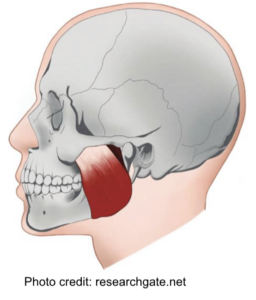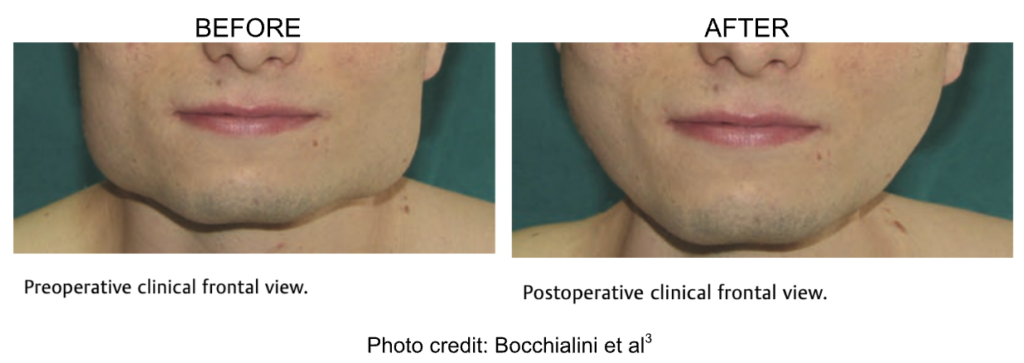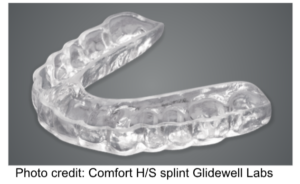Though the masseter muscle doesn’t have the same claim to fame as say biceps, it plays an important role in our ability to function on a daily basis. Humans have two masseter muscles, one on each side of our face. The masseter muscles are a set of powerful muscles belonging to a group of four pairs of muscles used for chewing. The masseter muscle helps us chew and eat our food. More specifically, the masseter muscle helps to elevate the lower jaw/mandible and to assist in protrusion/forward movement of the lower jaw. [1]

Due to increased stress in our modern lives, many of us have developed habits such as clenching or grinding our teeth, chewing gum, biting the sides of the tongue, biting nails, or chewing on objects like pens. Many of these habits are unconscious, so we are not aware that we have these habits. Over time, these habits can cause the masseter muscles to be overworked, resulting in either pain or hypertrophy of the muscle.[2]
Like what you’re learning? Download a brochure for our Orofacial Pain and Oral Medicine certificate or master’s degree program in partnership with the Keck School of Medicine of USC.
What is Masseter Muscle Hypertrophy?
Masseter muscle hypertrophy refers to the enlargement of the masseter muscle. This condition was first described in 1880 by an English physician named JW Legg. In general, it’s considered a rare condition and often, the true cause of it is unknown. [3] It’s typically observed in adults ages 20-40 years of age with no gender predominance and can be unilateral or bilateral. On its own, masseter hypertrophy is typically asymptomatic, though it can be associated with pain, clenching/grinding, and functional disorders of the jaw.
The most frequent complaint is that masseter hypertrophy can result in a square-angled face. This can create a more masculine look in a female face or a bottom-heavy appearance, and in cases of unilateral masseter hypertrophy, can cause jaw asymmetry. Patients may seek treatment for esthetic concerns. [4]

What Causes Masseter Muscle Hypertrophy?
Like many other muscles in our body, the masseter muscle can enlarge or bulk up due to being overworked. Although the exact cause of masseter muscle hypertrophy is unknown, there are some common factors that can contribute to overworking the masseter muscles, such as emotional stress, chronic clenching/grinding either during the day or during sleep, repetitive habits such as gum chewing or simply a preference for chewing on one side.
Is Masseter Muscle Hypertrophy Dangerous?
If it’s just an enlarged muscle, no, it is not dangerous or life-threatening. However, due to the large number of important anatomical structures neighboring the masseter muscle, it is necessary to rule out other potential sources of facial swelling, such as muscle tumors, salivary gland disorders, or other growths of the head and neck. If, after imaging and a thorough clinical history, the diagnosis of masseter hypertrophy is made, it is not, by itself, a life-threatening condition. In fact, it is often asymptomatic. However, it can cause psychological distress due to the exaggerated appearance of the muscle in the face. Hypertrophied masseter muscles cause the jaw to appear wide and the face rectangular.
What Kind of Treatments Are Available?
There are two different types of approaches to treating masseter muscle hypertrophy:

- Conservative/non-surgical therapies –
a. Splint therapy: Use of an oral appliance to help decrease biting forces from clenching and grinding.
b. Behavior therapy: Learn to become aware of and address behavioral habits that may be contributing to overworking the masseter muscles. Learn techniques to help with relaxation, stress management, thermal therapy (heat/ice to sore muscles), sleep hygiene, and dietary counseling.
c. Botulinum toxin type A (Botox ™, Xeomin ®, Dysport ® ) injection therapy: Freeze-dried botulinum toxin protein is reconstituted with sterile saline and then injected directly into the muscle to help reduce muscle contractions.
2. Surgical therapy –
The traditional method of treating masseter hypertrophy is to surgically remove part of the masseter muscle and jawbone or to perform liposuction of the fat near the muscle. These surgical procedures are done under general anesthesia. [5,6]
Masseter muscle hypertrophy is not a life-threatening condition, though it can cause some psychological distress. Be sure to discuss any concerns with your dentist. Your dentist may be trained to offer some conservative therapy or may refer you to an orofacial pain specialist or oral surgeon for further evaluation.
Earn an Online Postgraduate Degree in Orofacial Pain and Oral Medicine
Are you interested in a variety of issues focused on orofacial pain, medicine and sleep disorders? Consider enrolling in the Herman Ostrow School of Dentistry of USC’s online, competency-based certificate or master’s program in Orofacial Pain and Oral Medicine.
References
- Corcoran NM, Goldman EM. Anatomy, Head and Neck, Masseter Muscle. 2022 Jun 11. In: StatPearls [Internet]. Treasure Island (FL): StatPearls Publishing; 2022 Jan–. PMID: 30969691.
- Aguilera SB, Brown L, Perico VA. Aesthetic Treatment of Bruxism. J Clin Aesthet Dermatol. 2017 May;10(5):49-55. Epub 2017 May 1. PMID: 28670358; PMCID: PMC5479477.
- Bocchialini G, Castellani A, Negrini S, Rossi A. New Management in Bilateral Masseter Muscle Hypertrophy. Craniomaxillofac Trauma Reconstr. 2017 Dec;10(4):325-328. doi: 10.1055/s-0036-1592089.
Epub 2016 Nov 1. PMID: 29109846; PMCID: PMC5669985. - Almukhtar RM, Fabi SG. The Masseter Muscle and Its Role in Facial Contouring, Aging, and Quality of Life: A Literature Review. Plast Reconstr Surg. 2019 Jan;143(1):39e-48e. doi: 10.1097/PRS.0000000000005083. PMID: 30303926.
- Kundu N, Kothari R, Shah N, Sandhu S, Tripathy DM, Galadari H, Gold MH, Goldman MP, Kassir M, Schepler H, Grabbe S, Goldust M. Efficacy of botulinum toxin in masseter muscle hypertrophy for lower face contouring. J Cosmet Dermatol. 2022 May;21(5):1849-1856. doi: 10.1111/jocd.14858. Epub 2022 Feb 28. PMID: 35176198.
- Ayhan M, İşler SC, Kasapoglu C. Combination of Medical and Surgical Treatments for Masseter Hypertrophy. Case Rep Dent. 2018 Apr 5;2018:7168472. doi: 10.1155/2018/7168472. PMID: 29850280; PMCID: PMC5907395.

